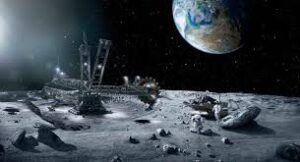
Moon Mining: Who Owns Space Resources?
The Moon—Earth’s closest celestial neighbor—is no longer just a symbol of exploration but a potential goldmine of resources. With advances in technology and renewed interest from governments and private companies, moon mining is becoming a real possibility. But as nations prepare to extract valuable minerals and water from the lunar surface, a crucial question arises: Who actually owns space resources?
Let’s explore the exciting frontier of lunar mining and the complex legal and ethical challenges surrounding space ownership.
🌕 Why Mine the Moon?
The Moon contains resources that could fuel space exploration and support life beyond Earth, including:
-
Water ice: Essential for drinking, oxygen, and even rocket fuel.
-
Rare metals: Such as helium-3, useful for future clean nuclear fusion energy.
-
Regolith: Lunar soil rich in minerals needed for construction and manufacturing.
Extracting these resources could reduce the enormous cost of launching supplies from Earth and open new economic frontiers.
🚀 Who’s Leading the Race?
Several countries and private companies are racing to establish a presence on the Moon:
-
NASA’s Artemis Program: Aims to return humans to the Moon and build sustainable bases.
-
China’s Lunar Exploration: Chang’e missions have mapped and analyzed the lunar surface extensively.
-
Private companies: Like SpaceX and Blue Origin are planning missions to support lunar mining ventures.
This race raises urgent questions about how space resources will be shared and regulated.
⚖️ The Legal Landscape: Who Owns the Moon?
The legal framework governing outer space is surprisingly limited and ambiguous:
-
The Outer Space Treaty (1967): Signed by over 100 countries, it states that space, including the Moon, is the “province of all mankind” and no country can claim sovereignty over celestial bodies.
-
The Moon Agreement (1984): Attempts to regulate moon resource use by declaring lunar resources the “common heritage of mankind,” but only a few countries have ratified it, and major space-faring nations have not.
-
National laws: Some countries, like the U.S. with its Commercial Space Launch Competitiveness Act (2015), allow their citizens and companies to own resources they extract from space, but this is controversial internationally.
🌍 The Ethical and Political Debate
Who should benefit from lunar resources? This question involves:
-
Equity: Should space resources benefit all humanity or only wealthy nations and corporations?
-
Environmental concerns: How to protect the Moon’s fragile environment from exploitation?
-
Conflict risk: Potential disputes over mining rights could lead to geopolitical tensions.
International cooperation and new treaties will be crucial to prevent a “space gold rush” from becoming a chaotic free-for-all.
🔮 What’s Next?
With lunar mining closer to reality, discussions about space law and governance are intensifying:
-
The United Nations Committee on the Peaceful Uses of Outer Space (COPUOS) is working on guidelines.
-
Countries are negotiating potential frameworks for resource sharing and conflict resolution.
-
Emerging technologies like robotics and AI will enable more efficient and safer mining operations.
🧠 Final Thought
Moon mining promises incredible opportunities for science, industry, and human expansion into the cosmos. But the question of who owns space resources is still unresolved and complex. Balancing innovation with fairness and stewardship will shape humanity’s future beyond Earth.
As we stand on the brink of a new space era, the Moon’s riches could either unite the world in a shared cosmic venture or spark disputes over the final frontier.
